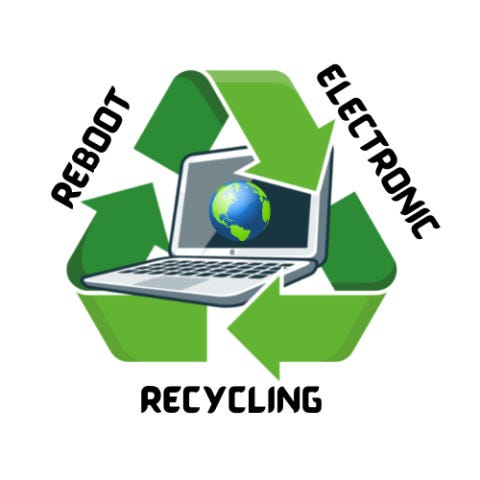Secure Disposal: The ABCs of Computer Recycling
Secure Disposal: The ABCs of Computer Recycling
Blog Article
Lasting IT Solutions: Trustworthy Computer Recycling Solutions
As technology continues to advance at a rapid speed, the problem of electronic waste, or e-waste, has become a pushing problem for both companies and individuals alike. The inappropriate disposal of computer systems and various other electronic gadgets not just adds to ecological deterioration, but likewise positions significant dangers to human health. Taking into account this, the demand for trustworthy computer reusing solutions has actually never ever been more extremely important. In this conversation, we will discover the environmental influence of e-waste, the benefits of accountable computer recycling, how to pick a trustworthy recycling service, the recycling procedure for computer systems and electronic gadgets, and the duty of government guidelines in e-waste monitoring. Join us as we discover the sustainable IT remedies that can assist us navigate the intricacies of digital waste in a responsible and trusted way.
The Ecological Influence of E-Waste
The incorrect disposal of digital waste, typically called e-waste, has substantial ecological implications. E-waste refers to thrown out digital gadgets such as computer systems, televisions, and smart devices (computer recycling). These tools include dangerous materials such as lead, mercury, cadmium, and brominated flame resistants, which can be harmful to both human health and the atmosphere otherwise effectively taken care of
When e-waste is poorly gotten rid of, it frequently winds up in landfills or is blazed, launching poisonous compounds into the dirt, water, and air. The release of these dangerous materials can pollute groundwater, pollute the air, and add to dirt degradation, positioning major wellness risks to close-by communities and communities.
Furthermore, the improper disposal of e-waste likewise contributes to the depletion of natural sources. computer recycling. Many electronic gadgets contain beneficial metals like gold, silver, and copper that can be recuperated and recycled if correctly recycled. However, when e-waste is not reused, these useful sources are shed, and the demand for brand-new raw materials increases, leading to boosted mining activities and additional ecological destruction.
To minimize the ecological influence of e-waste, appropriate recycling and disposal techniques need to be used. This consists of the accountable collection, dismantling, and recycling of electronic gadgets to recuperate beneficial materials and make certain the secure management of harmful substances. Executing efficient e-waste administration practices is vital to secure the setting, conserve resources, and advertise a lasting future.

Benefits of Liable Computer Recycling
Effectively reusing computers offers a wide range of advantages, including ecological preservation and source preservation. Liable computer system reusing not only assists stop electronic waste from winding up in land fills, yet it also decreases the requirement for resources and power in the manufacturing of brand-new gadgets.
Among the most considerable advantages of liable computer recycling is the conservation of the atmosphere. When digital waste is poorly dealt with, it can launch unsafe substances such as lead, mercury, and cadmium into the dirt and water, presenting a hazard to environments and human health. By reusing computer systems, these damaging products can be safely drawn out and disposed of, lessening the danger of air pollution.
One more advantage is resource preservation. Computer systems have beneficial materials like gold, light weight aluminum, copper, and silver, which can be recuperated and recycled via reusing procedures. By extracting and reusing these products, the demand for extracting brand-new sources is decreased, preserving natural sources and minimizing the ecological impact of source removal.
Moreover, responsible computer reusing helps to lower energy usage. Manufacturing new resource computers requires a significant amount of energy, from the extraction of raw products to the assembly process. By recycling computer systems and recycling their elements, the energy-intensive manufacturing procedure can be prevented, causing a reduction in greenhouse gas discharges and an extra sustainable usage of energy sources.
How to Pick a Trustworthy Computer System Recycling Service
When choosing a computer system reusing solution, it is vital to consider a few essential factors to ensure that you pick a trustworthy and trustworthy service provider. Information protection is an essential issue when reusing computers, as delicate information stored on old tools can be vulnerable to theft or abuse. By taking into consideration these variables, you can pick a computer recycling service that is honest, trusted, and ecologically accountable.
The Recycling Refine for Computers and Digital Instruments
To guarantee responsible disposal and minimize ecological impact, understanding the recycling procedure for computers and digital tools is essential when choosing a trustworthy recycling solution. The reusing process for these devices typically includes a number of phases.
First of all, the devices are collected from individuals, organizations, or drop-off points. This collection process may include transport logistics and secure managing to protect the delicate information included within the devices. Once gathered, the devices are arranged based upon their type, such as desktop computers, smartphones, or laptop computers.
After sorting, the gadgets undertake a complete information devastation procedure to make sure that any kind of individual or delicate information is permanently eliminated. This step is important to safeguard the privacy and safety of individuals and organizations. Information destruction methods may consist of cleaning, degaussing, or physical destruction of the storage space media.
Following, the tools are disassembled into their specific parts. This permits the separation of different materials, such as plastics, steels, and circuit boards. These products are then sent out to specialized reusing centers for further processing.
The recycling centers make use of different techniques to draw out beneficial materials from the digital waste. These products can be recycled or repurposed in the production of brand-new items. The remaining waste is disposed of in an eco accountable fashion, sticking to regulatory guidelines.
The Role of Government Regulations in E-Waste Monitoring
Government regulations play an important function in the reliable management of e-waste. With here the continuous development of the electronic devices industry and the increasing problem for ecological sustainability, the demand for proper disposal and recycling of electronic waste has actually become extra obvious. Government regulations assist to make sure that e-waste is handled in a sustainable and liable way.
Among the main duties of government policies is to set requirements and guidelines for e-waste management. These guidelines specify the proper approaches for collection, transportation, and recycling of electronic waste. By establishing these criteria, governments can make sure that e-waste is managed in a way that minimizes its influence on the environment and human health and wellness.
Government regulations likewise play a vital role in enforcing the correct disposal of electronic waste. They call for retailers and producers to take duty for the items they create and offer. This includes applying take-back programs, where producers are in charge of collecting and reusing digital waste from consumers. These policies aid to move the problem of e-waste administration from the individual customer to the sector, making sure that electronic waste is handled in a more sustainable fashion.

Final Thought
Finally, it is critical to think about the ecological influence of e-waste and pick a credible computer system recycling solution to properly get rid of digital devices. By complying with federal government policies and participating in correct recycling procedures, we can alleviate the negative impacts of e-waste on the environment and advertise a more sustainable future.
In this discussion, we will certainly discover the environmental effect of e-waste, the advantages of responsible computer system recycling, just how to select a credible recycling solution, the recycling procedure for computer systems and electronic devices, and the function of government regulations in e-waste monitoring. Computers have beneficial products like gold, click for more info copper, light weight aluminum, and silver, which can be recuperated and recycled through recycling procedures.In addition, liable computer recycling assists to lower power consumption. Data safety and security is an essential issue when recycling computers, as sensitive info stored on old gadgets can be at risk to theft or abuse. By taking into consideration these factors, you can select a computer reusing solution that is ethical, trusted, and ecologically accountable.
Report this page